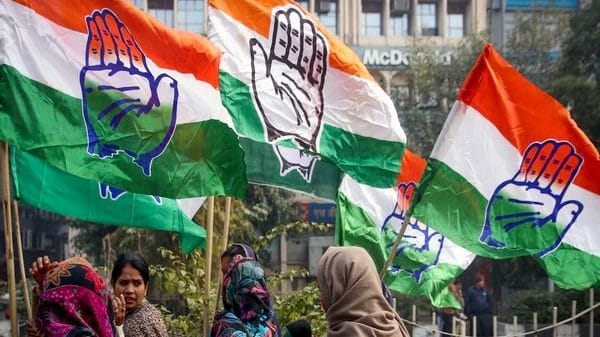The electoral performance of the Aam Aadmi Party in various state assembly elections over the past few years clearly indicates that it has expanded at the cost of Congress. Wherever AAP has managed to expand its support bases—Delhi, Punjab, Gujarat, and Goa—the vote share of Congress has declined drastically.
In the 2020 Delhi assembly election, AAP got 53.7 per cent of votes and Congress’ vote share declined to 4.3 per cent. It is important to note that the Congress ruled Delhi for 15 years, having polled 40.3 per cent votes in the 2008 assembly election.
In the 2022 Punjab assembly election, AAP won 92 assembly seats with a 42 per cent vote share. The tally of Congress went down to 18 seats and it managed to poll only 23 per cent votes. In both Delhi and Punjab, where AAP is now the ruling party, Congress has lost a significant amount of its support bases.
Even in the 2022 Gujarat assembly election, AAP polled 12.9 per cent votes at the cost of Congress, whose vote share declined by 14.2 per cent compared to the previous assembly election. The same year in Goa, the AAP polled 6.7 per cent votes and Congress’ vote share declined by 4.9 per cent compared to the previous assembly election. The evidence is enough to suggest that AAP’s rise in Indian politics has eroded the Congress support base in some states.
While this may be one reason that Congress party might be apprehensive about forming an alliance with the AAP, an analysis of the 2019 Lok Sabha election vote share suggests that even if the two parties join hands, it would still be difficult for them to challenge the BJP in states like Delhi and Gujarat, whereas in Punjab, Congress is unlikely to get any electoral dividend by aligning with the AAP.
Also read: Potential Congress-BSP alliance can spell doom for Samajwadi Party, stir UP politics
BJP and Lok Sabha polls
The BJP had won 282 seats in the 2019 Lok Sabha election by securing more than 50 per cent votes in states where AAP has a presence.
Let’s look at the situation on a state-by-state basis. In Gujarat, BJP won all 26 Lok Sabha seats by securing more than 50 per cent votes. It would be difficult for an AAP-Congress alliance to damage the BJP in Gujarat unless there is a big negative swing against the latter, which seems unlikely given the current mood of the voters in the state.
The situation remains the same in Delhi, where the BJP won all seven Lok Sabha seats in 2019 with more than 50 per cent vote share.
AAP may hope to generate a swing in its favour in Delhi, given its two successive victories in the 2015 and 2020 assembly elections with more than 50 per cent vote share. But the results of the 2014 and 2019 Lok Sabha elections are good evidence to suggest that the Delhi voters want AAP to run the assembly but they do not consider the party fit for a role in the central government.
Congress, even after losing badly to AAP in the assembly elections, got more votes from Delhi voters in the 2019 Lok Sabha election than AAP. Out of seven Lok Sabha seats, Congress emerged as the runner-up in five. AAP was the third party. The Arvind Kejriwal-led party was the second choice for voters only in South and North West Delhi.
In Punjab, out of the 13 Lok Sabha seats, the Congress won eight, the BJP won Gurdaspur and Hoshiarpur, and the Shiromani Akali Dal (SAD) won Firozpur and Bhatinda in 2019. Chief Minister Bhagwant Mann had won Sangrur with 37 per cent votes in the triangular contest where Congress polled 27.4 per cent and SAD polled 23.8 per cent. An alliance of AAP and Congress could damage the SAD in Bhatinda as it had won the seat with 41.1 per cent votes. And the duo could find it difficult to challenge the SAD in Firozpur as the latter won there by polling 54.1 per cent votes. SAD’s ally at that time, BJP, had won Gurdaspur with 50.1 per cent vote share. Even in Hoshiarpur, BJP’s 42.5 per cent vote share was marginally more than AAP and Congress’ combined 42 per cent. Given this scenario, the AAP-Congress alliance may find it difficult to snatch seats from BJP even in Punjab.
BJP won the North Goa seat by a big margin in 2019. It polled 57.1 per cent votes.
The voting pattern is different in Lok Sabha and assembly elections. Even with the maximum vote share in Delhi and Punjab, there are doubts about AAP getting similar support in the 2024 Lok Sabha election.
Given the electoral dominance that BJP enjoys in Delhi, Gujarat, Himachal Pradesh, and Uttarakhand, an alliance of AAP and Congress may not pose a challenge for the party unless there is a massive negative swing against it in these states.
Sanjay Kumar is a professor and co-director Lokniti-CSDS. Views are personal.
(Edited by Ratan Priya)






